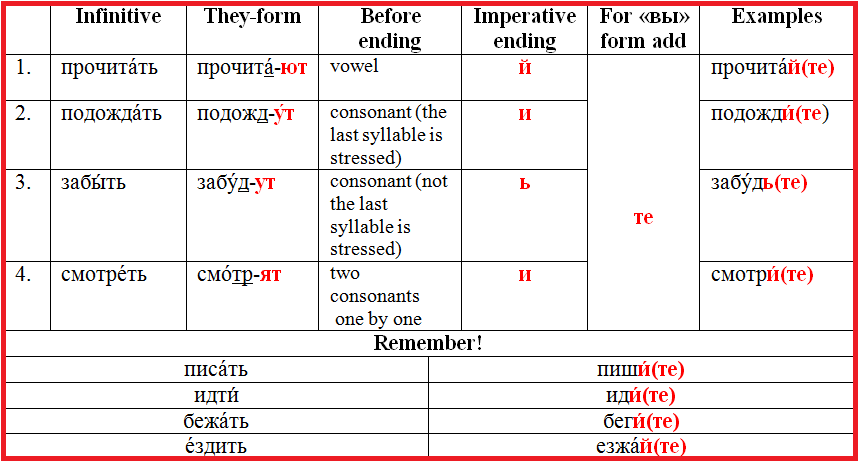Grammar (Imperative)
Imperative
We use the imperative mood (повелительное наклонение) when we tell other people what to do (command, recommendations, requests): we are addressing to someone to do something: Do it. – Сделай(те) это!
If we’re addressing to the second person, we use one of these endings -и, -й, -ь. For plural or formal form (вы) we have to add -те after the ending (-ите, -йте, -ьте). So here is the table which helps you to choose the correct ending.

And for reflexive verbs don’t forget to add the suffix -ся or -сь after the ending. For example,
Познакомься, это мой друг Антон.
1. For verbs which stem ends in a vowel
Take the 3d person plural form, drop the verb’s ending and add:
– й – for the singular or informal form (ты)
– йте – for the plural or formal form (вы)
ду́мать -> ду́мают -> ду́май / ду́майте (to think)
If it’s a reflexive verb – drop the verb’s ending and add
– йся – for the singular or informal form (ты)
– йтесь – for the plural or formal form (вы)
стара́ться -> стара́ются -> стара́йся / стара́йтесь (to try, to endeavour)
2. For verbs which stem ends in a consonant
Take the 3d person plural form, drop the verb’s ending and add
– и – for the singular or informal form (ты)
– ите – for the plural or formal form (вы)
проси́ть -> про́сят -> проси́ / проси́те (to ask)
If it’s a reflexive verb – drop the verb’s ending and add
– ись – for the singular or informal form (ты)
– итесь – for the plural or formal form (вы)
влюби́ться -> влю́бятся -> влюби́сь / влюби́тесь (to fall in love)
But if the stress of the infinitive comes on the stem of the verb, add ь and ьте accordingly:
знако́мить -> знако́мят -> знако́мь / знако́мьте (to present, to introduce)
Some irregular verbs in the Imperative mood
быть -> будь/бу́дьте (to be)
есть -> ешь/е́шьте (to eat)
ждать -> жди/жди́те (to wait)
идти -> иди/иди́те (to go)
